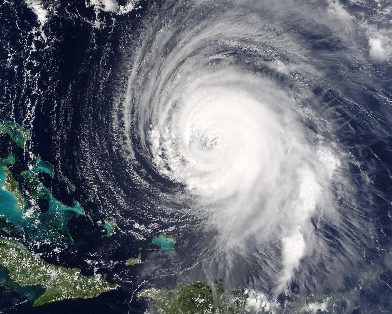

Mission Status Report #71 Star Date: Oct. 13, 2003
Dodging IsabelCaption: Hurricane Isabel spins north of Puerto Rico as a category 5 hurricane on Sept. 16. Several days later, the storm wreaked havoc on the eastern seaboard of the U.S., and nearly impacted FUSE operations by affecting the Satellite Control Center at JHU in Baltimore. (Photo from Terra satellite, courtesy NASA.)
I am happy to report that operations with FUSE continue to go very well. We managed to survive hurricane Isabel in September, which luckily missed Puerto Rico (where our primary ground station is located) but then roared up the east coast and impacted Baltimore and Maryland quite heavily. We were ready with diesel generator power for the control center, but it was not needed as the Hopkins campus was spared the worst of the power outages that ravaged surrounding areas. Since the last report, NASA has received a new crop of proposals for Cycle 5 of FUSE operations. The requested time substantially oversubscribes the time available, which is an excellent sign that the community wants to use FUSE! We are performing the technical evaluation of these proposals now, and the review panels will meet in mid-November. We are off and running for a new FUSE cycle. The new flight software continues to operate well (see the previous report). As of now, FUSE continues to operate with two gyros in the control loop. The only impact has been slightly longer acquisition times on average, something that was expected and really has no significant operational effect. With the "gyroless" development and testing behind us, we have made a serious move toward minimizing operational costs and downsizing the mission, while attempting to maintain quality operations. The control center, which has been staffed 24/7/365 since launch back in June 1999, has moved to a 16/5 (Monday through Friday) staffing profile over the last two months. This has been made possible by developing automated s/w checks during off hours, and installing an automated notification system for any problems detected during off-hours. Our ground system, including Mission Planning s/w, has had to make adjustments as well to eliminate any special operations (those requiring human intervention) during unstaffed hours. It hasn't been an easy adjustment, but then change is never easy. Unfortunately, as part of this process, several long term members of the FUSE family are moving on to new challenges and new positions. Here is a collective "thank you" to you all for your contributions to the project, and we wish you nothing but the best in the future. We shall carry on.
Reported by: Bill Blair, Chief of Observatory Operations
|
